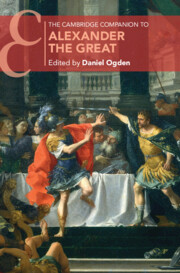Book contents
- The Cambridge Companion to Alexander the Great
- Cambridge Companions to the Ancient World
- The Cambridge Companion to Alexander the Great
- Copyright page
- Dedication
- Contents
- Figures
- Tables
- Maps
- Abbreviations
- Notes on Contributors
- Acknowledgements
- Introduction
- Part I Alexander’s Life and Career
- Part II Contexts
- Part III The Historical and Biographical Tradition
- Part IV The Ancient World’s Memory of Alexander
- 26 The Successors and the Image of Alexander
- 27 Alexander and The Roman Emperors
- 28 The Alexander Romance
- 29 Alexander in Jewish and Early Christian Literature
- 30 Alexander in Ancient Art
- Alexander’s Timeline 356–321 BC
- References
- Index
- Cambridge Companions to the Ancient World
27 - Alexander and The Roman Emperors
from Part IV - The Ancient World’s Memory of Alexander
Published online by Cambridge University Press: 04 January 2024
- The Cambridge Companion to Alexander the Great
- Cambridge Companions to the Ancient World
- The Cambridge Companion to Alexander the Great
- Copyright page
- Dedication
- Contents
- Figures
- Tables
- Maps
- Abbreviations
- Notes on Contributors
- Acknowledgements
- Introduction
- Part I Alexander’s Life and Career
- Part II Contexts
- Part III The Historical and Biographical Tradition
- Part IV The Ancient World’s Memory of Alexander
- 26 The Successors and the Image of Alexander
- 27 Alexander and The Roman Emperors
- 28 The Alexander Romance
- 29 Alexander in Jewish and Early Christian Literature
- 30 Alexander in Ancient Art
- Alexander’s Timeline 356–321 BC
- References
- Index
- Cambridge Companions to the Ancient World
Summary
The Alexander most visible to us today is one who was created and recreated in the Roman period. While Alexander’s presence in literature is strong enough that we can reasonably describe the trajectory of intellectual interest in Alexander during the Roman period, more difficult to pin down is the degree to which powerful Romans engaged in conscious imitatio or aemulatio Alexandri, which generally involves squaring literary hints with material evidence that does not always speak to us as directly as we would like it to. Without dismissing the world of ways in which various aspects of Alexander-myth may have been subtly exploited by powerful Romans, this paper charts a path between overly credulous and overly sceptical conclusions concerning individual Romans by taking an overview approach of imperial interest and tightening our definitions of ‘imitation’ or ‘emulation’ in the context of Romans and Alexander. I conclude that both imitatio and aemulatio look quite different at Rome than they do in the provincial east.
Keywords
- Type
- Chapter
- Information
- The Cambridge Companion to Alexander the Great , pp. 438 - 451Publisher: Cambridge University PressPrint publication year: 2024

